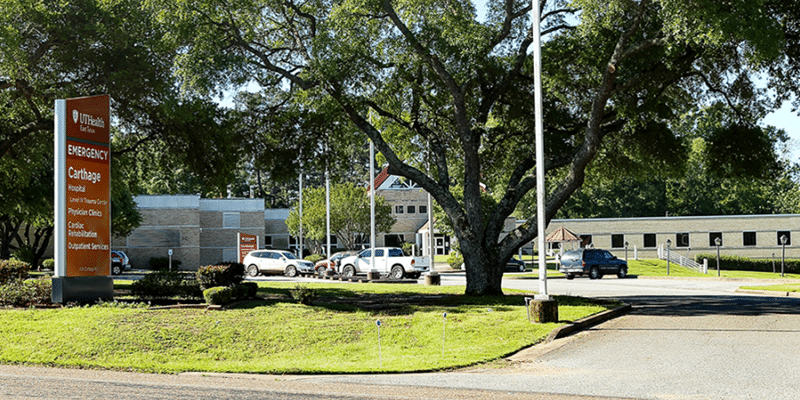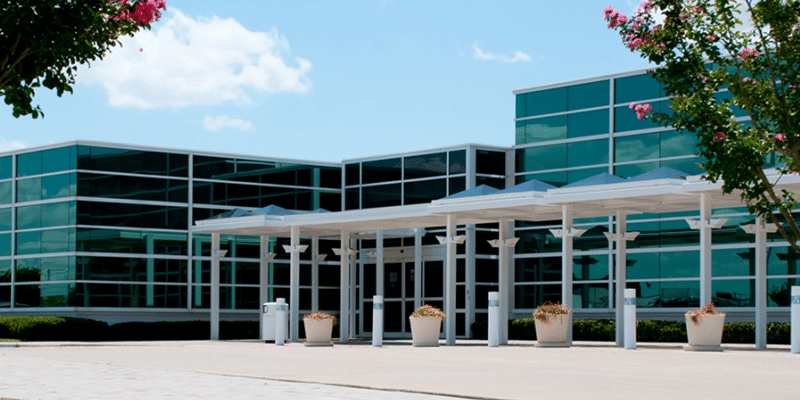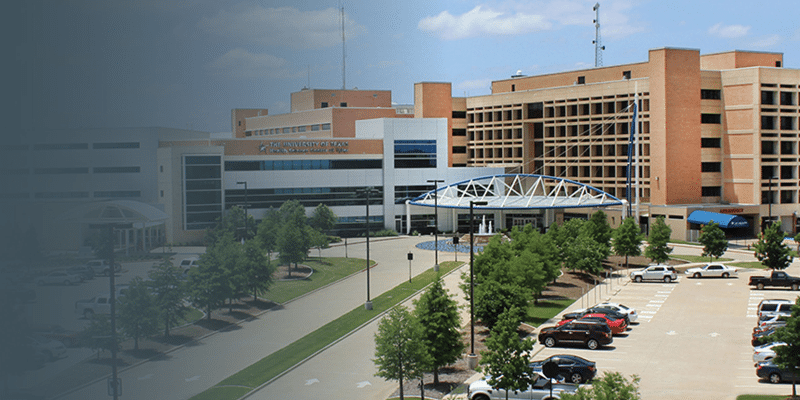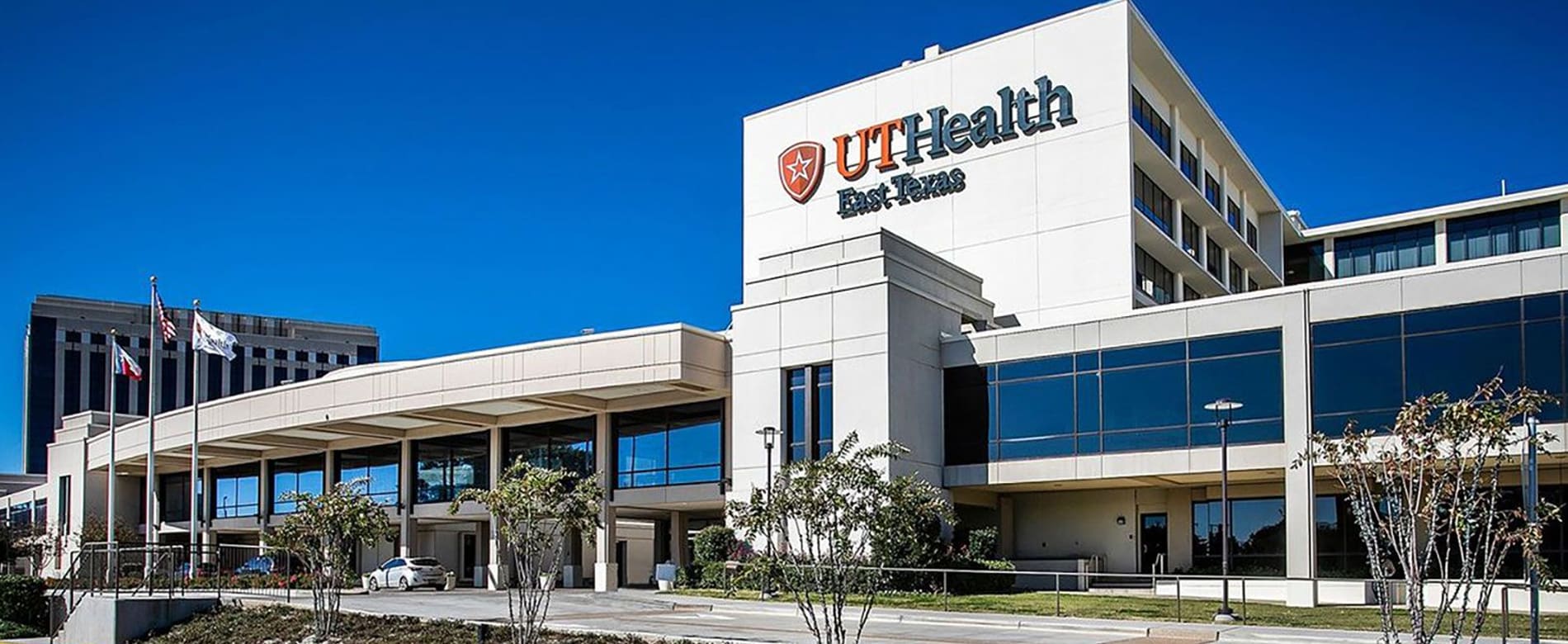Helping East Texans sleep better: Expert care for sleep disorders
Welcome to the UT Health East Texas Sleep Disorders Center, your trusted partner in addressing and overcoming sleep disorders across all age groups. Our sleep medicine specialists understand the vital role sleep plays in your health and well-being. Adequate sleep is vital for proper body function in any age group. That’s why we offer a wide range of treatments for various sleep disorders, ensuring that every patient—from infants to the elderly—receives the expert care they need. Whether you’re struggling with insomnia, seeking obstructive sleep apnea treatment, or are curious about our sleep studies, our sleep disorder clinic is here to help you achieve the restorative sleep you deserve.

Sleep disorder symptoms
Sleep can be divided into two types: (REM) sleep and non-REM (NREM) sleep. NREM sleep has three stages of increasingly deep sleep. Stage N1 sleep is the lightest stage and stage N3 is the deepest. During normal sleep, you cycle through these types and stages of sleep. However, if your sleep is repeatedly interrupted and you cannot cycle normally through REM and NREM sleep, you may feel tired, fatigued, and have trouble concentrating and paying attention while awake. Sleepiness puts you at greater risk for car accidents related to driving while drowsy.
Symptoms of sleep disorders include:
- Body movements during sleep
- Daytime sleepiness
- Excessive snoring
- Feeling unrefreshed upon awakening
- Frequent awakenings during sleep
- Frequent urination at night
- Impaired memory
- Moodiness
- Morning headaches
- Night sweats
- Waking up gasping for breath
- Weight gain
If you are experiencing these symptoms, consider obtaining a referral from your primary care provider to consult with one of our sleep specialists.
Sleep disorders we treat
Our sleep disorder specialists provide comprehensive diagnostic and treatment services for the following sleep disorders:
Central sleep apnea
Central sleep apnea is a condition defined by pauses in breathing due to a lack of respiratory effort during sleep. Unlike obstructive sleep apnea, the pauses in breathing throughout the night are due to the lack of respiratory muscles activating or the brain failing to activate the respiratory muscles that control breathing during sleep.
To breathe in, our brain sends a signal to the diaphragm and the muscles of our rib cage to contract. The contraction of the diaphragm and rib cage muscles produces an inhalation. In central sleep apnea, there is typically a lack of communication from the brain to these muscles. It is important to note that a few central apneas per night is considered normal. We often “forget to breathe” briefly as we drift off to sleep or after waking up.
How is central sleep apnea different From obstructive sleep apnea?
Obstructive sleep apnea results from airway blockage during sleep despite continued breathing effort. The airway becomes blocked by excess tissue or from pressure created by excess body weight, leading to sleep fragmentation and low oxygen levels during sleep.
In central sleep apnea, the problem is not a blocked airway. Instead, pauses in breathing are the result of a miscommunication that occurs between the brain and the muscles that control breathing during sleep. As a result, normal respiratory effort is disrupted and does not always occur. It should be noted that it is possible to have both obstructive and central sleep apnea at the same time, and both are detected by a thorough in-lab overnight sleep study.
If you are suffering from a sleep disorder, ask to be referred to UT Health East Texas by your physician or call 903-531-8079 to begin the referral process.
Idiopathic hypersomnia
Idiopathic hypersomnia is a chronic neurological sleep disorder marked by excessive daytime sleepiness despite adequate—or even prolonged—nighttime sleep. Individuals may struggle to stay awake during the day, often experiencing long, unrefreshing naps. Unlike narcolepsy, idiopathic hypersomnia lacks symptoms such as sudden muscle weakness (cataplexy) or abnormal REM sleep patterns.
Insomnia
Insomnia can be divided into three types:
- Sleep-onset insomnia – Difficulty falling asleep
- Sleep-maintenance insomnia – Difficulty staying asleep
- Early awakening – Waking up at an early hour, unable to go back to sleep
Evaluation by a physician board-certified in sleep medicine is recommended to determine the root cause of insomnia. Sleep-onset insomnia may be related to anxiety or to restless legs syndrome (RLS). Sleep-maintenance insomnia is often related to obstructive sleep apnea (OSA), nocturia and periodic limb movement disorder (PLMD), while early awakening may be related to depression.
In general, people who experience symptoms of insomnia feel unable to get adequate sleep at night. They may have trouble falling asleep, wake up frequently during the night or wake early in the morning unable to return to sleep. Insomnia is considered a problem when it affects daytime activities. Insomnia has many possible causes, including stress, anxiety, depression, poor sleep habits, circadian rhythm disorders and taking certain medications.
How is insomnia treated?
In cases where there is no obvious cause for sleeplessness, a sleep study is warranted to rule out any of the aforementioned causes. A sleep study entails spending the night in a sleep lab where brain activity, respiratory movements and oxygen saturation are monitored.
If no identifiable cause of insomnia is found following a sleep study, sleep hygiene practices should be reviewed and addressed. Good sleep hygiene involves developing healthy sleep habits such as going to bed at the same time every night and waking up at the same time every morning. Also, limiting time spent in bed without sleeping, avoiding alcohol and smoking before going to bed, avoiding watching TV or looking at a cell phone or laptop within two to three hours of bedtime. As well as avoiding caffeinated beverages after 3 p.m.
Some medications should be avoided in the evening, such as diuretics, corticosteroids and theophylline, and should be given in the morning. If you’re experiencing insomnia, talk with your doctor about your medications. Increasing physical activity during the day and avoiding naps is extremely important. Prior to going to bed, the room should be dimmed and the temperature should be kept as cold as can be tolerated.
Pharmacologic treatment is the last resort in the treatment of insomnia. Over-the-counter melatonin is a relatively safe first-line therapy, but you should consult your physician before taking any sedatives for sleep.
Narcolepsy
Narcolepsy is a neurologic disorder that causes extreme daytime sleepiness and In some cases of narcolepsy, the patient may experience episodes of uncontrollable muscle weakness known as cataplexy or episodes of paralysis upon awakening known as sleep paralysis. For those suffering from narcolepsy, daytime sleepiness is caused by the brain’s inability to control normal sleep/wake cycles resulting in uncontrollable sleepiness that interfere with daily functioning. Driving with untreated narcolepsy is particularly dangerous due to the risk of sudden muscle weakness or urge to sleep. There is sometimes a genetic component, but most patients have no family history of the problem.
How is narcolepsy diagnosed?
Narcolepsy can be difficult to diagnose, and a thorough evaluation by a physician board certified in sleep medicine is recommended for patients exhibiting symptoms of narcolepsy. Symptoms of narcolepsy often begin in adolescence, and can often be dismissed or attributed to lifestyle or poor sleep habits. For this reason, patients often go undiagnosed for many years.
For proper diagnosis, an overnight sleep study should be performed to evaluate quality of sleep and rule out other causes of daytime sleepiness, such as sleep apnea. Following the overnight sleep study, a multiple sleep latency test (MSLT) should be performed to assess the patient’s level of daytime sleepiness after a full night’s sleep. The MSLT involves a series of brief nap trials performed throughout the day. The daytime MSLT should only be performed when other sleep disorders have been ruled out by the preceding overnight sleep study, or when daytime sleepiness remains after sleep apnea has been adequately treated.
How is narcolepsy treated?
A board-certified sleep specialist will carefully evaluate sleep study results, medical history, medications, and symptoms in order to accurately diagnose and treat narcolepsy. This disorder is typically treated through lifestyle changes and medications.
Daytime sleepiness related to narcolepsy can be debilitating for the sufferer and should be treated carefully. Patients may need to try different medications under the supervision of an experienced sleep specialist to find what type of treatment works best for them.
Nocturnal seizures
Nocturnal seizures are epileptic events that occur predominantly or exclusively during sleep, often during transitions between sleep stages, particularly light sleep. These seizures can vary widely in presentation—from subtle movements or vocalizations to more dramatic shaking or jerking—and may go unnoticed for years.
Because they occur at night, nocturnal seizures can disrupt sleep architecture and lead to daytime fatigue, cognitive issues, and mood disturbances. Diagnosis typically involves overnight EEG monitoring. Treatment strategies include antiepileptic medications and lifestyle adjustments aimed at improving sleep consistency and reducing seizure triggers.
Obstructive sleep apnea
One of the most common and life-threatening sleep disorders is obstructive sleep apnea, where a person breathing is repeatedly disrupted during sleep due to complete or partial airway obstruction. Each time breathing stops, normal sleep is disrupted to allow the body to resume breathing. This may happen hundreds of times per night, with the sufferer having no recollection of sleep disturbances. Obstructive sleep apnea may lead to high blood pressure, cardiovascular disease, weight problems or other health problems.
Signs of obstructive sleep apnea include:
- Body movements during sleep
- Daytime sleepiness
- Feeling unrefreshed upon awakening
- Frequent awakenings during sleep
- Frequent urination at night
- Gasping or choking sounds during sleep
- Impaired memory
- Loud snoring
- Moodiness
- Morning headaches
- Night sweats
- Waking up gasping for breath
- Weight gain
Obstructive sleep apnea is treated with lifestyle changes, oral appliances, breathing devices and sometimes surgery. The goal is to help you restore regular breathing during sleeping and relieve your snoring and/or daytime sleepiness. If you have mild obstructive sleep apnea, some changes in daily activities or habits might be all the treatment you need.
If you have mild obstructive sleep apnea, the following changes in daily activities or habits might be all the treatment you need:
- Avoid alcohol and medicines that make you sleepy.
- Lose weight if you’re overweight or obese. Even a little weight loss can improve your symptoms.
- Sleep on your side instead of your back to help keep your airway open during sleep.
- Keep your nasal passages open at night with nasal sprays or allergy medicines, if needed. Talk with your doctor about whether these treatments might help you.
- If you smoke, quit. Talk with your doctor about programs and products that can help you quit smoking.
If you are suffering from a sleep disorder, ask to be referred to UT Health East Texas by your physician or call 903-531-8079 to begin the referral process.
Parasomnia
Parasomnias are episodes of atypical and often undesirable behavior or activity that occur during sleep. They are known to disrupt sleep, cause a person to act unpredictably during sleep, and can be difficult to manage for the sufferer and their bed partner.
Examples of parasomnias include
- Confusional arousals: Confusional arousals are episodes of confusion and disorientation after any awakening from sleep. They may involve sleepwalking, sleep talking, teeth grinding, and an absent or “glassy” stare. Confusional arousals are very common in children, but are known to occur in adults as well. Like sleepwalking, confusional arousals occur during NREM stage-3 sleep, usually during the first third of the sleep period after an awakening from sleep, with the person having no memory of the event afterwards.
- Night terrors: Night terrors, also known as sleep terrors, are a type of parasomnia—a disruptive sleep disorder involving sudden arousals from deep non-REM sleep. Unlike nightmares, which occur during REM sleep and are usually remembered, night terrors strike during the first few hours of the night and often leave the individual with no recollection of the event. These episodes can involve intense fear, screaming, flailing, and a rapid heart rate, even though the person remains mostly unaware and difficult to awaken. Night terrors are most common in children but can occasionally affect adults, especially those under stress or with other sleep disorders. While they’re usually harmless and outgrown with age, frequent or severe episodes may warrant medical evaluation.
- Nightmare disorder: Nightmare disorder involves frequent nightmares that cause awakenings and disrupt sleep regularly. Nightmares are frightening or disturbing dreams that occur during REM sleep. They can occur at any time during the sleep period, as a person may have multiple REM periods throughout the night. Frequent nightmares can significantly disrupt sleep by causing abrupt awakenings, insomnia following the episode or insomnia at bedtime related to anxiety caused by the possibility of nightmares.
- REM sleep behavior disorder: REM sleep behavior disorder (RBD) occurs when a person acts out their vivid dreams during REM sleep. Those afflicted with RBD may act out violently and aggressively during sleep, which can be dangerous and cause injury to a bed partner. Episodes can occur at any time during the sleep period, as a person may have multiple REM periods throughout the night. This disorder is most common in men over the age of 50 and is often associated with an underlying neurological disorder such as Parkinsonism or dementia.
- Sleep talking: Sleep talking, also called “somniloguy,” is very common and involves frequent episodes of talking during sleep. Talking during sleep can occur during any stage of sleep, at any time during the sleep period. Speech may be filled with nonsense, difficult to understand, and may be barely audible or very loud. Sleep talking is relatively common and no cause for concern, but in some cases, can be a symptom of an underlying sleep disorder.
- Sleep walking: Sleepwalking often involves a person getting out of bed while still asleep and unresponsive, walking around and acting unpredictably. Sleepwalkers may perform tasks, speak, shout, and act out of character. They may carry on full conversations and speak in nonsense, act crudely or in a strange manner. Episodes of sleepwalking occur during NREM stage-3 sleep, usually during the first third of the sleep period. The patient is still asleep but may appear awake with a confused or “glassy” stare. Sleepwalkers typically have no memory of these events.
Pediatric sleep disorders
Sleep has very important effects on growth, healing, immune function, cardiopulmonary function and metabolic activities. Sleep in humans is a biologic function as important as breathing. Restricted sleep in adults may manifest as excessive daytime sleepiness; however, in children it often takes the form of mood and behavioral disturbances such as hyperactive behavior, poor impulse control, irritability, grouchiness, inattention, impaired memory and ability to reason, which results in significant social and learning problems. The effects of sleep and loss of sleep impact everyone significantly, particularly children.
The latest guidelines from the American Academy of Sleep Medicine (AASM), endorsed by the American Academy of Pediatrics (AAP), recommend the following minimum and maximum hours of sleep per day for each age for optimal health:
- Ages 4-12 months:12-16 hours (including naps)
- Ages 1-2 years: 11-14 hours (including naps)
- Ages 3-5 years: 10-13 hours (including naps)
- Age 6-12 years: 9-12 hours
- Age 13-18 years: 8-10 hours
Keep in mind that sleep requirements can vary by individual. When comparing two children of the same age with the same bedtimes, one child may feel rested upon waking, while the other child may require more sleep in order to perform well in school and avoid the adverse effects of sleep deprivation such as behavior problems and daytime sleepiness.
Similarly, the effects of inadequate sleep in children can vary by individual and manifest in different ways, as no two children are the same.
Here are some statements about your child’s sleep that signify adequate, normal sleep in children. With regard to your child’s sleep, if you agree with all of the following statements, it is a good sign that your child’s sleep is on track. If your child’s sleep demonstrates disagreement with one or more of the following statements, a sleep study may be necessary to rule out a sleep disorder as the cause.
- Your child falls asleep within 15-20 minutes of lying down to sleep at bedtime.
- Your child regularly sleeps a total of hours according with the recommended hours for their age in a 24-hour period.
- While in bed, your child’s sleep is continuous.
- Your child wakes up feeling refreshed after a night of sleep.
- Your child feels alert, energetic and content during the waking hours.
- Your child does not have any disturbing or out of the ordinary behavior during sleep such as mouth breathing, snoring, breathing pauses, restlessness, gasping or increased work of breathing.
What can I do to promote healthy sleep in my child?
You need to practice good sleep hygiene to promote healthy sleep in your child. Sleep hygiene are the habits and practices that are conducive to sleeping well on a regular basis. The following are good sleep hygiene practices that promote a restorative sleep:
- Keep regular bedtimes, even on weekends, that allow your child to sleep the recommended hours of sleep for their age.
- Promote the habit in your child to use the bedroom just to sleep. Avoid using the bedroom as a playroom. Avoid use of electronics in the bedroom.
- Limit the use of electronic devices one hour prior to bedtime as blue light from screens suppresses melatonin release. Melatonin is the hormone secreted by the pineal gland in the brain in response to darkness at the end of the day. Melatonin promotes sleep at the beginning of the night. Light of any kind can suppress the normal secretion of melatonin; however, the blue light from electronic devices does so more powerfully. As a result, your child will have a hard time falling asleep at night when they are permitted to use electronic devices late at night.
- Avoid food and drinks that contains caffeine and sugar in the afternoon and evenings such as soda and energy drinks. Caffeine is a stimulant that acts on the central nervous system and keeps your child awake. Sugar intake before bedtime can have a stimulating effect, leading to restlessness and reduced deep sleep during the night.
- Limit your child’s activity and exercise close to bedtime, as exercise stimulates the central nervous system and keeps your child awake.
- Keep the same routines every night prior to bedtime.
- Keep electronics out of your child’s bedroom, including video games, televisions, computers and cell phones.
- Keep the bedroom comfortable, cool and dark at night.
- Encourage your child to sleep independently.
- Avoid unnecessary excitement at bedtime, such as scary movies or stories that may cause emotional distress in your child. Taking the time to relax and wind-down after the events of the day encourages restful sleep.
What are the signs of sleep problems in my child?
Signs of sleep problems in children include:
Awakenings during the night
Behavioral problems
Depression, which can be associated with insomnia and/or irregular sleep
Excessive daytime sleepiness. Taking naps in school-age children.
Falling asleep in class
Headaches
Hyperactive behavior and decreased attention span
Poor school performance
Snoring, particularly if it is associated with gasping, restlessness, mouth breathing, breathing pauses during sleep and bed-wetting may indicate obstructive sleep apnea.
If you are suffering from a sleep disorder, ask to be referred to UT Health East Texas by your physician or call 903-531-8079 to begin the referral process.
Periodic limb movement disorder
PLMD is a sleep-related movement disorder characterized by repetitive, involuntary jerking or twitching of the limbs—most commonly the legs—during sleep. These movements typically occur in clusters and may last from a few seconds to minutes, frequently disrupting the sleeper’s rest even if they’re unaware of it.
Unlike restless leg syndrome (RLS), which involves discomfort while awake, PLMD occurs only during sleep and is often detected via a sleep study. Its exact cause is unclear, but it’s sometimes associated with iron deficiency or other neurological conditions. Treatments may involve medications like dopaminergic agents or addressing any underlying conditions contributing to the disorder.
Restless leg syndrome
RLS is a neurological disorder marked by uncomfortable sensations in the legs—often described as crawling, tingling, or itching—that provoke an irresistible urge to move them. These symptoms typically worsen in the evening or at rest, particularly before sleep, disrupting the onset of sleep and leading to chronic insomnia or daytime fatigue.
The condition is believed to involve dopamine dysfunction and can be associated with iron deficiency, kidney disease, or pregnancy. Treatment may include iron supplementation, dopaminergic drugs, lifestyle changes, and avoiding caffeine or alcohol. Unlike PLMD, RLS affects wakefulness and is behaviorally triggered, making it easier to identify without a sleep study.
Sleep-disordered breathing related to neuromuscular disorders
This form of sleep-disordered breathing arises when neuromuscular conditions—like muscular dystrophy, amyotrophic lateral sclerosis (ALS), or spinal cord injuries—impair the muscles that control breathing. During sleep, especially in REM stages when muscle tone decreases, affected individuals may struggle to maintain adequate ventilation, leading to hypoventilation or pauses in breathing.
Symptoms include fragmented sleep, daytime sleepiness, morning headaches, and difficulty concentrating. Diagnosis often requires specialized sleep studies and lung function tests. Treatment typically involves non-invasive ventilation methods like BiPAP or CPAP during sleep to support breathing and enhance sleep quality.
Sleep apnea treatment
At UT Health East Texas Physicians, we commonly diagnose and treat central sleep apnea and obstructive sleep apnea. Getting a good night’s rest is vital to your overall health, which is why our sleep medicine specialists take sleep apnea seriously. We provide a number of sleep apnea treatments, including:
Breathing devices
Continuous positive airway pressure (CPAP) is the most common treatment for moderate to severe sleep apnea in adults. A CPAP machine uses a mask that fits over your nose, or over both your nose and mouth to allow for mouth breathing. The machine gently blows air into your throat. The pressure from the air helps keep your airway open while you sleep.
Treating obstructive sleep apnea may help you stop snoring. However, when snoring has stopped, this does not mean that you no longer have obstructive sleep apnea or should stop using CPAP. Obstructive sleep apnea will return if you stop using your CPAP machine or do not use it correctly.
CPAP treatment may cause side effects in some people. These side effects include a dry or stuffy nose, irritated skin on your face, dry mouth, and headaches. If your CPAP is not adjusted properly, you may get stomach bloating and discomfort while wearing the mask. If you are having trouble with CPAP side effects, contact us to help you. For example, the CPAP settings or size/fit of the mask might need to be adjusted. Adding moisture to the air as it flows through the mask or using nasal spray can help relieve a dry, stuffy, or runny nose.
There are many types of CPAP machines and masks. Tell your doctor if you are not happy with the type you are using. He or she may suggest switching to a different type that might work better for you.
Inspire
Inspire is the only Food and Drug Administration (FDA) approved obstructive sleep apnea treatment that works inside your body to treat the root cause of sleep apnea with the click of a button. Inspire is a small device that is surgically inserted just under the skin during an outpatient procedure. This new treatment option helps sleep apnea patients who cannot use continuous positive airway pressure (CPAP). Inspire allows you to breathe normally, without a CPAP mask, hose or machine.
Inspire delivers gentle stimulation to key airway muscles helping keep the airway open for better breathing during sleep. The Inspire system is controlled by a small handheld sleep remote. The user turns on the device with the sleep remote before going to sleep and turns it off upon awakening. You may be a candidate for Inspire if:
- You have moderate to severe obstructive sleep apnea.
- You are unable to use or get consistent benefit from CPAP.
- You are not significantly obese.
- You are over the age of 22
A significant decrease in snoring has been found as a secondary effect of the Inspire device. Ninety percent of bed partners report no or soft snoring by their partner. If you are suffering from obstructive sleep apnea, ask your health care provider for a referral to UT Health East Texas or call 903-531-8079 to begin the referral process.
Oral appliance therapy
A mouthpiece may help you if you have mild obstructive sleep apnea. Your doctor also may recommend a mouthpiece if you snore loudly but do not have obstructive sleep apnea. Custom-fit mouthpieces are typically referred to as “oral appliances” and involve mandibular advancement, with this type of treatment called “oral appliance therapy”. There are countless anti-snoring mouthpieces and devices sold online that do not involve mandibular advancement and would not be recommended as therapy for OSA.
A dentist or orthodontist can make a custom-fit oral appliance for treating obstructive sleep apnea. The oral appliance will adjust your lower jaw and your tongue to help keep your airway open while you sleep. If you use a oral appliance, tell your doctor if you have discomfort or pain while using the device. You may need periodic office visits so your doctor can adjust your oral appliance to fit better.
Surgery for obstructive sleep apnea
Some people who have obstructive sleep apnea might benefit from surgery. Surgery is done to widen breathing passages. It usually involves shrinking, stiffening, or removing excess tissue in the mouth and throat or resetting the lower jaw. In children, surgery to remove the tonsils can be beneficial if they are blocking the airway but you should consult your child’s pediatrician.
The Inspire Sleep Apnea Innovation implant device maybe an option as well for adults 22 years of age and older. Inspire delivers gentle stimulation to key airway muscles helping keep the airway open for better breathing during sleep. To learn if you meet the criteria for Inspire, schedule an appointment with one of our board-certified pulmonologists.
Sleep studies we offer
UT Health East Texas Sleep Disorders Center offers a full range of sleep testing procedures. With convenient locations all across East Texas. Our goal is to make your exam as easy as possible. All exams require a physician’s order.
We offer the following sleep studies:
- Diagnostic polysomnogram: This test is used to diagnose sleep disorders. It records brain waves, oxygen levels in the blood, heart rate, breathing, as well as eye and leg movements.
- Therapeutic polysomnogram: Positive airway pressure (PAP) therapy is administered and titrated throughout the overnight polysomnogram to determine optimal therapy settings and effectively treat sleep disordered breathing and improve overnight sleep quality. This study is normally performed after a diagnostic polysomnogram and a consultation with the sleep physician.
- Combination polysomnogram (split night): This test is used to both diagnose and treat severe sleep apnea during the same procedure. If time allows and severe sleep apnea is documented early in the diagnostic study, positive airway pressure (PAP) therapy is administered and titrated during the second half of the test. Requests for combination studies should be reserved for patients who have already been diagnosed with sleep apnea, or patients with a clinical history or symptoms that indicate a high likelihood of severe disease such as gasping upon waking and hypoxia confirmed by overnight oximetry.
- Home sleep apnea test: This test is used in diagnosing obstructive sleep apnea in select adults. This test is only one component of a comprehensive sleep evaluation, and it is important for a board-certified sleep medicine physician to be involved in reviewing and interpreting the raw data from the device.
- Multiple sleep latency test (MSLT): This test is for excessive daytime sleepiness and measures how quickly the patient falls asleep in a quiet environment during the day. This is the standard tool used to diagnose narcolepsy and idiopathic hypersomnia.
- Maintenance wakefulness test (MWT): This test measures how alert a patient is during the day. It shows whether or not they are able to stay awake for a defined period of time. This is an indicator of how well the patient is able to function and remain alert in quiet times of activity.
When you visit a UT Health East Texas facility for a sleep study, you can expect compassionate care from a team of expert sleep specialists. The UT Health East Texas Sleep Disorders Center in Tyler, Texas was the first sleep center in East Texas to receive program accreditation from the American Academy of Sleep Medicine (AASM) in 2004. Since then, several UT Health East Texas Sleep Disorders Center facilities have been accredited by the American Academy of Sleep Medicine. Those locations include UT Health Tyler at CVC, Loop & McDonald Rd. UT Health Henderson, UT Health Athens, and UT Health Pittsburg.
Please call us to book a sleep study at one of our accredited facilities.
About our sleep studies
At the UT Health East Texas Sleep Disorders Center our sleep study services are designed to provide comprehensive evaluation aimed at diagnosing and treating a wide range of sleep disorders to improve sleep quality and continuity.
Our noninvasive sleep study procedures are performed with electrodes applied painlessly to the skin. Patients will sleep overnight in a private suite with a comfortable bed to ensure a restful environment where your sleep patterns can be observed and recorded. We also offer daytime sleep testing for those experiencing significant and excessive daytime sleepiness.
Upon completing the sleep study, your physician will carefully review the results and discuss effective treatment options with you, aiming to significantly improve your sleep quality and help you achieve a more restful night.
What to expect during a sleep study
In many cases, an overnight evaluation is needed to learn what is causing the sleep/wake disturbance. Your brain waves, heart rate, snoring, respiration, leg muscle activity and oxygen saturation levels are monitored. The recording techniques are noninvasive and painless, with electrodes applied to the skin surface at areas where monitoring is needed for data collection and recording
After the electrodes have been applied, you will spend the night in a comfortable bed in the UT Health East Texas Sleep Disorders Center and sleep will be monitored throughout the night. When additional testing is needed for evaluation of excessive daytime sleepiness, a daytime test begins in the morning following an overnight sleep study when sleep apnea has been ruled out as the cause of daytime sleepiness. This test involves a series of five naps taken at two-hour intervals, with lunch provided.
Once a sleep study is completed, your physician will be able to discuss treatment recommendations so you can have a peaceful night’s sleep.








